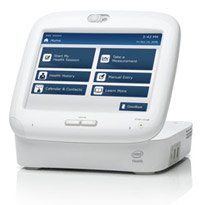BT and NHS Wakefield District have announced a telehealth trial for patients suffering from chronic heart failure. The trial uses the Intel Health Guide personal health system to help patients manage their condition from home.
Approximately 30 patients have been using the personal telehealth system to record their vital signs and connect to their clinicians, most often a practice nurse. The pilot started last July and is due to complete in February.
The Intel Health Guide allows patients to record important information about their health including vital signs such as blood pressure, oxygen levels and weight which is then sent for analysis.
The telehealth device also has built-in videoconferencing, which means the healthcare professional treating the patient can hold a consultation with them from their computer, a feature that proved popular in the trial.
Community heart failure matron, Richard Brothwell, said: “This technology allows us to keep in touch with patients and monitor their health daily without always seeing them physically.
"That means we can see more patients and those taking part in the trial are telling us they find the remote monitoring very reassuring.”
The Health Guide device allows nurses to more easily monitor early warning signs that a patient’s health may be deteriorating and take early action.
For patients with chronic heart failure, early warning signs can include rapid weight gain over a few days due to water retention if they don’t take their medication.
Alan Wittrick, chief executive of NHS Wakefield District, said: “While in its early days, overall the feedback we are receiving from patients and community nurses is encouraging.
"Patients have said they feel more in control of their condition and in some cases it has transformed their lives, although we appreciate this won’t be the case for everyone on the trial.”
Data can be sent and video conferencing with a nurse can be enabled with the device connected to standard broadband. Existing connections were used in 70% of the patient homes involved in the trial. Some other services require an expensive, dedicated broadband connection.
BT Health’s chief clinical officer, Dr Justin Whatling, said: "Telehealth not only demonstrates how existing technology can benefit patients and give them more control and confidence in the care they receive; it also has the potential to save the health service millions of pounds.”
He told eHealth Insider that Wakefield is now doing a full scale business evaluation of the service, examining whether to extend it beyond February. Dr Whatling added that other NHS trusts are now in discussions about taking similar services.
BT says that the trial has put the company in a better position to provide future telehealth services at much larger scale. “BT wants to be a scale partner for this. We expect a significant market to emerge and we are preparing assets to enable us to deliver at scale,” said Dr Whatling.
Robert Wills, BT’s telehealth programme manager, told EHI that an important part of the pilot had been to deliver using existing connections and to do so quickly. “We did 20 connections in the space of 10 days, its very simple to deploy and for patients to use.”
Dr Whatling said the speed of deployment meant that one option would be for NHS bodies to commission short, 30 day, packages of monitoring services for when patients were discharged from hospital.
The coalition government has put a new onus on hospitals to prevent unecessary readmissions within 30 days, although it will be up to primary care trusts to commission support and ‘re-enablement’ packages.

